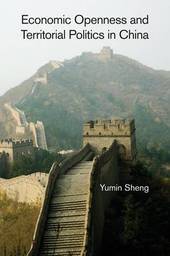
|
Economic Openness and Territorial Politics in China
Paperback / softback
Main Details
| Title |
Economic Openness and Territorial Politics in China
|
| Authors and Contributors |
By (author) Yumin Sheng
|
| Physical Properties |
| Format:Paperback / softback | | Pages:314 | | Dimensions(mm): Height 228,Width 152 |
|
| Category/Genre | International economics
Political economy
Economic history |
|---|
| ISBN/Barcode |
9781107507425
|
| Classifications | Dewey:327.51 |
|---|
| Audience | | Professional & Vocational | |
|---|
| Illustrations |
22 Tables, unspecified; 11 Line drawings, unspecified
|
|
Publishing Details |
| Publisher |
Cambridge University Press
|
| Imprint |
Cambridge University Press
|
| Publication Date |
5 March 2015 |
| Publication Country |
United Kingdom
|
Description
Why and how has the Chinese central government so far managed to fend off the centrifugal forces under rising globalization that are predicted to undermine national-level political authority everywhere? When institutionally empowered by centralized governing political parties as in China, national politicians confronting the menace of economic openness will resort to exercising tighter political control over the subnational governments of the 'winner' regions in the global markets. Although its goal is to facilitate revenue extraction, redress domestic economic disparity, and prolong the rule of national leaders, regionally targeted central political control could engender mixed economic consequences. Sheng examines the political response of the Chinese central government, via the ruling Chinese Communist Party, to the territorial challenges of the country's embrace of the world markets, and the impact of the regionally selective exercise of political control on central fiscal extraction and provincial economic growth during the 1978-2005 period.
Author Biography
Yumin Sheng is an Assistant Professor of Political Science at McGill University. His research interests include globalization and domestic politics, federalism and decentralization, and regional political representation and resource redistribution under authoritarianism, with a focus on contemporary China. His recent work has also appeared in the British Journal of Political Science, China Quarterly, Comparative Political Studies, the Journal of Contemporary China, and Studies in Comparative International Development. He previously taught at Wayne State University and was a Visiting Research Fellow at the East Asian Institute of the National University of Singapore.
Reviews'Yumin Sheng's book is a welcome addition to the debates on China's political future. He challenges the conventional wisdom that globalization is a threat to central control over local governments in China. Instead, he shows that the Chinese Communist Party's ability to appoint local officials has prevented the decentralization and disintegration of political control. By keeping political power in the hands of compliant agents, the CCP helps ensure its survival. Thoroughly researched and well written, it deserves to be read by all those interested in China's future as well as the impact of globalization.' Bruce Dickson, George Washington University 'Using a sophisticated and rigorous methodological approach, Yumin Sheng incisively disentangles the thorny question about how Beijing has managed to retain control over China's vast state at the same time that economic reforms have loosened its control over China's rapidly growing economy.' Andrew Wedeman, University of Nebraska-Lincoln 'Economic Openness and Territorial Politics in China is carefully crafted. It offers much insight into the relationship between Beijing and the provinces at a time of rapid growth with growing inequality and exposure to global markets. Sheng has written a must-read volume on China's political economy and governance.' Dali L. Yang, University of Chicago and Founding Faculty Director of the University of Chicago Center in Beijing 'Whether China's political center can maintain its strong grip over provincial governments and whether, in turn, those provincial governments can maintain their own grip over the people, is an age-old question. With this book, Yumin Sheng has become one of the scholars to whom the world should turn for answers.' The China Journal
|